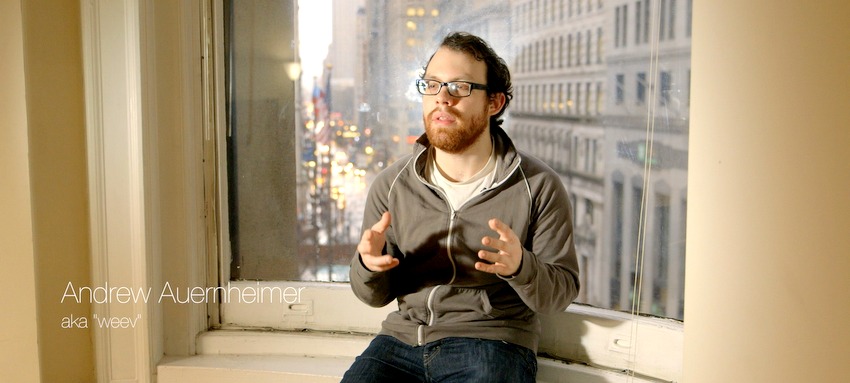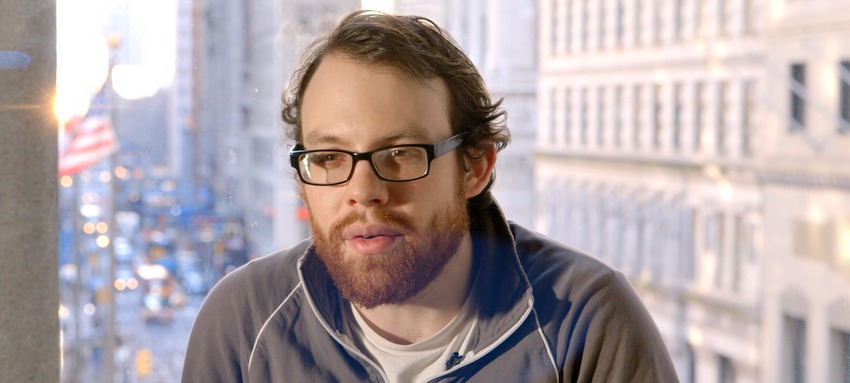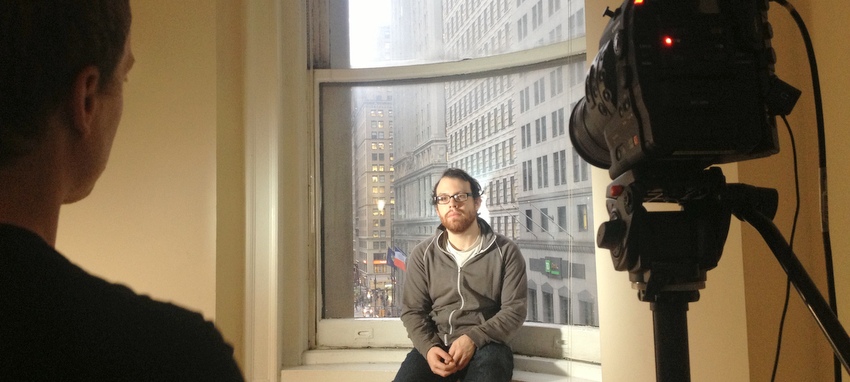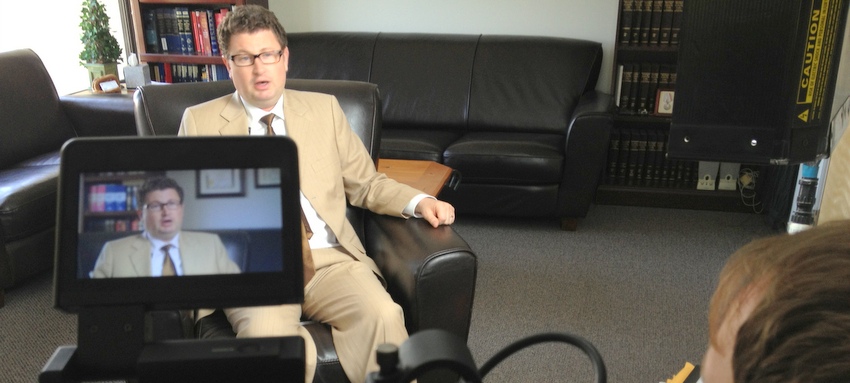
George Russell‘s spellbinding expose on Andrew ‘Weev’ Auernheimer is now available on VOD.
From innocent meme culture to malicious propaganda, the avant-garde has moved online and they have an agenda. Emerging from deep within underground computer programming culture, internet trolls are disenfranchised and using the click-bait obsessed mass media to propel their performance art into the mainstream. Whether mischievously entertaining the masses, influencing presidential elections, or manipulating journalists and corporations, trolls are either saving us or driving our culture off of a cliff.
Prosecuted as a whistleblower by the Federal Government, Troll Inc. follows the world’s most famous Internet troll, Andrew Auernheimer, and his merry band of provocateurs as they take on corporate America, the media, and political-correctness.
Hung on a meticulously framed, no-holds-barred interview with Auernheimer that took three, six-hour days, and at which the only sustenance served was plenty of high-definition rope, the film features case studies of his most notorious, just-barely illegal actions, like that time he revealed a gaping security hole in the iPad’s partnership with AT&T and when he erased all books with homosexual content from Amazon dot anything-but-calm.
After viewing Troll. Inc., its hard not to wonder if the grand scale of these invasions into our privacy and passions, by virtue of their regularity and overwhelming scope, didn’t somehow numb us to the very notion of privacy and normalizing this new Internet “fake news” attack culture, paving the way for the Kremlin to master the art of the troll and undermining our democracy right under our noses and in our own virtual backyards.

indieactivity: When did your filmmaking careers kick off?
George: I made a micro-budget documentary on an inner-city school in Compton that I was given a bizarre level of access to. That film did well internationally but didn’t get any exposure in the US. Then I produced and shot part of a Showtime doc on the US Drug War. For that film I organized police ride-alongs and filmed vice cops taze and throw a net over a drug-crazed guy who had stripped naked and was terrorizing a Chinese food restaurant. At that moment I knew that I was in the right business.
indieactivity: What was it about movies that had you fixed on building a career making them?
George: bIt’s the modern version of writing novels. There is a reason very few great books have been written since the 1960s. You can count them on one hand. That was the last generation of writers who grew up without television. I always wanted to write but never found any traction for it and the hypnotic quality of imagery and its related technology was too much to resist.
indieactivity: Most cite “Star Wars” as one of the films that spurred them towards a career as a filmmaker. What film was it for you?
George: The ethereal side of film is what I find appealing so the first time I saw Days of Heaven I was drawn to it. The scenes in Nights of Cabiria when the kids are playing on the weird playground equipment is another version of that, as is most of Night of the Hunter. It’s a hard effect to pull off in a documentary but there are aspects in Troll Inc. that have that.
indieactivity: What was the first thing you shot?
George: My friend and I convinced our high school social studies teacher to let us make a video for a project, instead of writing a paper. We took his parents video camera and made a mockumentary on Jimi Hendrix but it wasn’t obvious it was fake, so the teacher thought we’d actually interviewed his family members, etc. We never told her it was fake so when she found out a few days later we got into significant trouble. The principal already knew us pretty well by that time so we were given detention and it was forgot about.

indieactivity: And how do you think you’ve improved as a filmmaker since then?
George: I’ve understood to not rely on other people’s opinions and trust your instincts. For instance most of your crew, especially if you’re not able to pay them much, will just want to do the bare minimum and move on. If you’re a nice guy this means all your films will suck. You can’t accept this situation as it will burn you in the edit room.
You have to have good audio. Focus has to be perfect. If something went wrong you have to do it again. You have to shoot at magic hour which means people will have to get home late. Part of your job as a filmmaker whether as producer or director is to force people to perform at their highest level, and that includes yourself. Money helps with this at the higher levels but if you don’t have a lot of money if you can find crew people in key positions who do this naturally grasp on to them and never let them go, as they’ll make you look good.
I’ve also realized filmmaking is about getting out there and doing it. There are no gatekeepers and if you have true grit you’ll make it. Then, if your film is horrible the marketplace will decide you are a failure, but at least you gave it a shot. The cream rises and quality can’t be dismissed. But, you also have to be willing to fail because most people are going to create a lot of really bad stuff before anything good.
indieactivity: Is there a sequence in the latest movie that you’re truly proud of, one you can genuinely step back from and say ‘wow, that looks great’!? – OR in this case, plays great?
George: The dream sequence of time lapse shots at the end of the film where the overall conclusions of the film are expressed I think worked out pretty well. It was supposed to be meditative and ethereal, and feel timeless, like spirits whispering into your ear and it usually plays that way. Other times I’m like “what the hell was I thinking?”

indieactivity: How did you get ‘Weev’ onboard the movie? Did it take some convincing?
George: He wanted his story told and it only took mild encouragement. Plus, it’s an interesting story that really needed to be told, so it worked out for both of us. I told him I’m going to make a film about trolling and the world you come from, are you interested? That was the extent of it. He was a very toxic character and most normal people want to distance themselves from him. For a filmmaker that is a good place to be because most of the good subjects get snatched up quickly and this one was just sitting out there waiting to have someone make a film on it.
indieactivity: Did they have much time to get to know each other before the shoot began?
George: No, the DP, Krystof Andres, and I flew from Los Angeles to New York City one evening after his trial but before his sentencing and we started filming the next morning. Time was of the essence because we were on a limited budget and we had limited access to our filming locations, so we had to get it done.
indieactivity: Where did you shoot the movie?
George: His interview was shot in a condo that a computer programmer friend of Andrew’s owned. We couldn’t have asked for a more iconic location. It was right off Wall Street with a great view of Trinity Church next door and an American flag waving in the background. Plus, it helped us verify his story about Dominique Strauss-Kahn as it was in the same building he was staying in when he perpetrated that epic troll.
indieactivity: What do you hope audiences get from the movie?
George: I hope they see that the individual trolls themselves aren’t necessarily responsible for trolling, that we’ve all helped create this atmosphere for them to thrive in. Of course individually they’re responsible for their own actions but the idea of trolling and the fact that it is now a mainstream activity is just a by-product of the media environment we live in.
The media operate like trolls and take someone like Andrew and make him famous. Without the New York Times writing a story on him Andrew would never be as well-known as he is, almost famous you could say. That really started his public career. But, when you look at the way even network news has become a version of clickbait journalism, you realize Andrew is simply a product of this wider environment of alienation and consumerism that we’ve hitched our wagon to not as a country but on a global scale.
I think we can be positive about life when we look towards our families and the people around us we care about and have meaningful relationships with, but when you look out at the social landscape and what we’re becoming as a society it’s terrifying. And, I wouldn’t blame Andrew for that, I’d blame each of us playing our own little role whether it’s looking at our phones instead of interacting, or using any means available to pretend that having instant access to any consumer good possible will actually bring us contentment.
I saw an ad for the version of Amazon’s Alexa to put in your kid’s room today and it occurs to me that’s our future: children asking a massive, global corporation focused on squeezing every dollar out of you it can for something instead of their parents. I am starting to hate the Internet.
Follow George Russell online
IMDb
In Camera by Naqqash Khlalid Launch on VOD April 29
Naqqash Khlalid’s Directs Nabhan Rizwan. In Camera stars an EE BAFTA Rising Star Award Nominee.
2025 Philip K. Dick Sci-Fi Film Festival Award Winners Announced
Vanessa Ly’s Memories of the Future Awarded Best PKD Feature
Dreaming of You by Jack McCafferty Debuts VOD & DVD for April Release
Freestyle Acquires “Dreaming of You” for April 15th Release
Hello Stranger by Paul Raschid set for London Games Festival & BIFFF
The film Is set for an April 10th Premiere at The Genesis Cinema in London (LGF) and BIFFF
Daydreamers Official Trailer by Timothy Linh Bui: Released by Dark Star Pictures
Daydreamers Vietnamese Vampire Thriller – May 2nd release
Afternooner by The Harrow Brothers: Funniest Movie of the Decade on VOD & DVD April
Freestyle Acquires “Afternooner” for April Release









